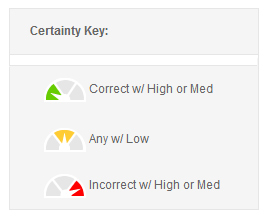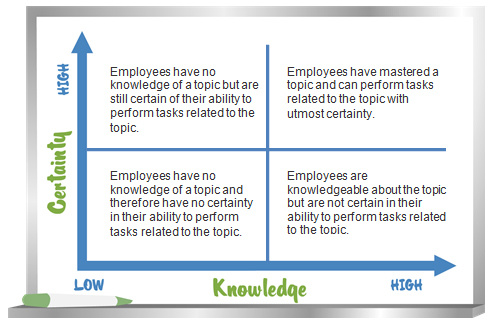Learner Certainty Assessment: Proving Training Works (Part1)
As you might imagine, certainty-based assessments have been on the radar at Michaels & Associates for some time now. To that end, here is the first installment of a two-part article to provide you further details on this type of training assessment.

How do you currently assess learners' knowledge after completing a training course? If your strategy includes presenting a series of instructionally sound multiple choice questions that reflect the learning objectives, you should be congratulated. However, many learning professionals and stake-holding managers have realized a margin for error in this typical assessment method - the guess factor.
In other words, learners tend to guess at questions they don't know, in an attempt to raise their scores. These guesses might be based on 1) sheer speculation or 2) a combination of limited knowledge and a lack of confidence in that knowledge. In either instance, guesses can contribute to an unrealistic measurement of competence. Guessing can also contribute to false information the learner takes away from the learning experience. In some line-job performances, that false certainty can lead to very high-risk behavior.
Presenting a Simple Solution
What is a Learner Certainty Assessment (LCA)? LCA, which is also known as Certainty-Based Marking, is a simple and relatively new technique that strives to make training measurement more realistic. This LCA strategy incorporates two equal elements in assessment: Knowledge and Certainty. Consider the four knowledge/certainty relationships in the following table:

At the end of a training program, you hope most employees are in the High Knowledge / High Certainty quadrant, but how do you know for sure? That's where Learner Certainty Assessment can help.
What Does LCA mean to the organization?
Why should your organization consider LCA as a strategy for assessing competence? Think about the following:
- If everyone is uncertain on the same subject matter, perhaps the material was not presented well, or perhaps the content should be revalidated.
- It is very high risk to put high certainty / low knowledge employees in front of your customers or behind your products or machinery.
- You want your training program to assess learning, teaching and curriculum effectiveness with a high level of reliability. Using LCA reporting data, your credibility with funding sources can rise because you can functionally prove the effectiveness of your training.
- Assessments showing learner certainty can be both formative (part of the learning process) and summative (reporting on current knowledge).
- LCA challenges deeper knowledge; it goes beyond simple factual or associative learning.
- Using LCA reporting data, you can discover more about learners' needs and adjust instruction to improve individual achievement and/or improve test questions.
By encouraging higher level thinking (analysis, synthesis and evaluation), you develop a stronger, more competent workforce and contribute to the organization's risk reduction goals.
What Does LCA mean to learners?
When the learner is presented with LCA questions, a much greater depth of thought is required to complete the assessment than is typical in the usual assessments, even very well designed ones. For instance, a typical thought process might be:
- What other information do I know that can assist me in determining my level of certainty for this answer?
- When I answer a question correctly with high certainty, my level of confidence increases.
- The instructor will know that I am not only passing the test, but that I am certain in my answers.
- If I want to guess at a question, I'd better admit a level of uncertainty and review the course material again, or review other instructional resources.
- A highly certain answer that is wrong means I need to pay closer attention and not rush judgment in the reliability of my answer. I will need to go back and review this material again.
How does LCA help learners?
- It encourages them to analyze all issues related to a question, not just the question alone.
- It helps them gain confidence by contemplating and identifying the reliability of their answers.
- It encourages them to analyze how much and how well they understand new concepts.
- It helps them identify misconceptions about their knowledge, allowing them to reflect on the concepts and better understand their misconceptions.
- It allows them to become active participants in the assessment process and, therefore, the learning process.
- It reduces rote or passive participation.
Giving learners the ability to better gauge their individual needs, learner certainty is an assessment technique providing more realistic training measurement that ultimately benefits both administrators and learners.
Next time, we will discuss how LCA works and possible modes to implement it at your organization. Until then, we'd be delighted to hear your thoughts about this enhanced testing feature.
~ ~ ~ ~ ~ ~ ~ ~ ~ ~
Continue reading:
Learner Certainty Assessment: Proving Training Works (Part2) →



